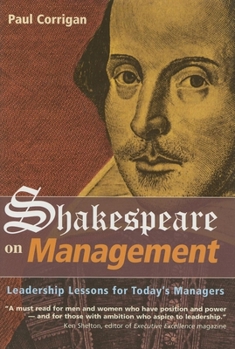Shakespeare on Management: Leadership Lessons for Today's Management
Select Format
Select Condition 
Book Overview
""In Shakespeare on Management"" Paul Corrigan takes a fascinating look at the psychology of leadership using classic Shakespearean characters. He shows how, through his plays, Shakespeare demonstrates the different roles a leader can take and the different skills needed. He analyses the decision-making and actions of certain characters to see what can be learnt by today's managers, such as:
Format:Hardcover
Language:English
ISBN:0749428457
ISBN13:9780749428457
Release Date:August 2000
Publisher:Kogan Page
Length:244 Pages
Weight:1.16 lbs.
Dimensions:0.9" x 6.3" x 9.3"
Customer Reviews
2 ratings
Shakespeare on Management
Published by Thriftbooks.com User , 15 years ago
Had to purchase this book for a class, and I thought it would be boring, but it turned out to be a very interesting book.
Highly entertaining book on what makes leaders successful
Published by Thriftbooks.com User , 25 years ago
Modern managers will find a great deal of relevance in how Shakespeare's characters handled those around them in this highly entertaining book in five parts on what makes leaders successful. No in-depth knowledge of Shakespeare is required as all is explained in detail.In Shakespeare's time, `senior managers' were called `leaders' (read kings, queens, dukes and lords), whose job was to lead an organization (read nation, clan or county). Running an organization then, as now, required consummate leadership skills.Understanding how Shakespeare's characters fare as leaders provides lessons for most modern organisations since the issue of leadership is so central to their survival. An analysis of the characters who fail as well as succeed as leaders is provided.Part 1 underlines the different reasons why Shakespeare's leaders can provide lessons for today's managers. Part 2 explores the way in which Shakespeare creates individual leaders (Richard II, King Lear and Antony) who fail because they believe that power and authority are enshrined in them as people. Part 3 covers leaders (Richard III, Macbeth and Coriolanus) who fail because they believe that authority resides in the ability to manipulate and to use fear to maintain power.Part 4 explores the one heroic and successful leader Shakespeare created-Henry V-who recognized that to become a great king he has to learn how to do it. And in order to learn how to do it he needs to learn not from other kings but from his future subjects.Part 5 demonstrates both in Shakespearean and modern management terms the importance of understanding the life of the mailroom as well as the boardroom. The two are interconnected and a brilliant leader knows not just how, but never forgets it. Both the Fool in King Lear and Falstaff in Henry IV Parts 1 and 2-strong personalities who provide truthful messages contrary to the company line-are vital to the generation of good leadership.Reviewed by Azlan Adnan. Formerly Business Development Manager with KPMG, Azlan is currently managing partner of Azlan & Koh Knowledge and Professional Management Group, an education and management consulting practice based in Kota Kinabalu, Sabah, Malaysian Borneo. He holds a Master's degree in International Business and Management.






